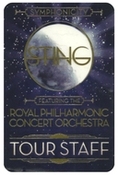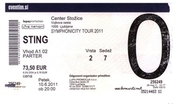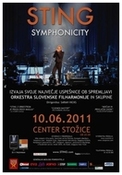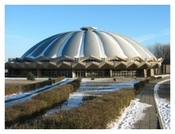
Sting was the first of the "greats" to experience the acoustically unfriendly Stožice Hall together with the symphony orchestra...
Few pop singers dare to perform with a symphony orchestra, only one has dared to come with him (so far) to the acoustically weak Stožice Hall and left it to a standing ovation.
As a solo artist and as a member of The Police, Sting has received 16 Grammy Awards, two Brit Awards, one Golden Globe Award, one Emmy Award, three Oscar nominations, the Billboard Magazine Century Award, and the MusiCares Personality of the Year Award in 2004. He is also a member of the Rock and Roll Hall of Fame and the Songwriters Hall of Fame, among others.
"It's great to be back in Slovenia. I'm glad that the Slovenian orchestra is with me," Sting told the crowd of several thousand visitors in Stožice. With a thoughtfully crafted introduction to his classics and the melodies of hits he created with The Police (Every Little Thing She Does is Magic, If I Ever Lose My Faith in You, Englishman in New York and Roxanne), he won the audience over in the first minutes of the concert. This also made it easier for them to get used to the orchestral experience that followed the opening set of the evening. At the same time, Sting did not immediately challenge himself with the unknown, thus preparing the ground for pushing the boundaries in the rest of the two and a half hour long concert. Especially after the 20-minute break, when his more demanding listeners came to their senses rather than Sting's "generalists".
After a minimalist arrival on stage, when the image of the 59-year-old in black was accompanied only by the reflection of the spotlight, and thunderous applause, when all doubts disappeared that this could be another canceled foreign concert on our soil, there was a harsh contact with reality - or rather the sound system. The sound engineers made sure that the story did not repeat itself as clearly as it did with the first song of the evening. While listening to the evergreen Every Little Thing She Does Is Magic by The Police, many a visitor, glued to his seat, got the feeling that he had come to listen to an uncoordinated clash of an instrumental band with the vocally impeccable Sting.
The key question of the evening, which began with an academic delay of 15 minutes, was not how the musician would establish a connection with the sold-out VIP box (the price for it was 73.50 euros), the sold-out two boxes (the price for the box ranged between 53.50 euros and 63.50 euros) and the stands (the price was 48.50 euros), but when.
He had already succeeded with the classic The Police Englishman in New York, when the drum rhythm was complemented by applause from the audience and after Sting's: "Be yourself," the crowd echoed: "No matter what they say."
There was no need to fear that his every move and sigh would not be accompanied by the gaze of 100 ardent fans in the front rows (since they were willing to pay 182 euros for the view) and his admirers in the boxes (their tickets cost 101.50 euros).
The musician, who in his career as a solo artist and as a member of The Police has received 16 Grammy Awards, two Brit Awards, one Golden Globe Award, one Emmy Award, three Oscar nominations, the Billboard Magazine Award of the Century and the MusiCares Personality of the Year Award in 2004, acted on the Stožice stage like a veteran who has just found pleasure in songs that have been played 1,000 times. Playful when needed, sensual and lyrical the next moment.
His vocals and other musical abilities (he also showed his knowledge on the guitar and organ) were accompanied by the Slovenian Philharmonic Orchestra under the baton of conductor Sarah Hicks, who spent exactly three hours with the symphony orchestra before the concert (as reported in TV Dnevnik). The concert in Stožice served as a kind of general, as Sting will continue his tour with the Slovenian symphony orchestra at four upcoming concerts in France.
Sting was not the first performer to come to Stožice with the symphony orchestra; José Carreras and Helena Blagne in a reduced band had done so before him. But he was the first major foreign musician from the pop/rock music scene to bring an orchestra to the stage.
As expected (the repertoire itself differed only slightly from the one he performed with three days ago in Belgrade), the tempo of the entire evening was kept in first gear. Which was perfect for establishing a romantic atmosphere, but at times too sleepy.
Sting moved from experienced confessions to melodic singing and made it clear that he was not alone on stage when he gave up his place to the orchestra (during Mad About You, When We Dance, etc.). He acted confidently during the transitions and devoted a lot of time to communicating with the audience. "My father gave me one piece of advice: when I finished school, I should go to the seaside. He obviously wanted me to see the world. I disappointed him. I wrote this song for him when he died," he shared a part of his intimacy with Stožice before announcing Why Should I Cry For You?, which he dedicated to his late father. His voice, which easily moved to high notes and ended with a characteristic vibrato, was occasionally joined by backing vocalist Jo Lawry. Although the sweetness of her voice cannot be compared to the greatness of R'n'B diva Mary J. Blige, she solidly replaced her in Whenever I Say Your Name, which Sting recorded with Blige in 2003. The song, with its female vocals and violin solo, considerably livened up the atmosphere with a funk/hip-hop heater. Before the break, which he announced with the words: "Now I'll speak Slovenian: 'After the next song there will be a 20-minute break.'," he also served up a lively rock-symphonic reworking of the Police's Next To You.
With organ in hand, he began the second part of his concert a few minutes after half past nine with the all-famous rhymes of Shape of My Heart. Then the orchestra rose like a phoenix from the ashes. First with This Cowboy Song, where they conjured up an almost Wild West and (again) overdubbed the vocal part. But this didn't bother Sting too much, as in the middle of the song he started dancing in the style of a cowboy at one of the "John Wayne" parties. Just a few songs later, he proved once again that he does not experience music only through vocals, as he transformed into a vampire and skilfully performed (only for this occasion, he put on a cloak) the role of a hunter for human blood while singing Moon Over Bourbon Street - a song that marked his 1985 solo debut The Dream of the Blue Turtles.
He won over the audience, already a little lost from the dreamy ballads, with a humorous interlude in the song All Would Envy: "The next song is about an older man and a much younger woman. Tragedy!" Just one song later, when the melody Every Breath You Take sounded from the speakers, that concert atmosphere that people glued to their seats simply cannot stage began.
The stage stood up, part of the stands stood up. You could say that every little thing he did from then on was magical. In the end, the audience just jumped out of their chairs during the biggest hits (Desert Rose, She's Too Good For Me and Fragile) and he was called to the stage twice. Sting concluded the punk-rock orchestral experience by singing a rearranged Message in The Bottle, with skilful walks of his hand along the guitar neck. Without Morse code, with the help of Stožice, he managed to send an "SOS" (call for help) to the world again, despite the acoustically imperfect ambience.
(c) MMC RTV Slovenija by Klavdija Kopina
06102011
SET LIST
- Every Little Thing She Does Is Magic
- If I Ever Lose My Faith In You
- Englishman In New York
- Roxanne
- Mad About You
- When We Dance
- Russians
- I Hung My Head
- Why Should I Cry For You?
- Whenever I Say Your Name
- Fields Of Gold
- Next To You
- Shape Of My Heart
- This Cowboy Song
- Moon Over Bourbon Street
- End Of The Game
- All Would Envy
- King Of Pain
- Every Breath You Take
- Desert Rose
- She's Too Good For Me
- Fragile
- Message In A Bottle





